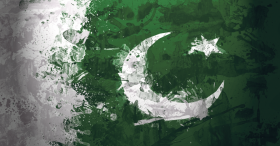Nyhet! Vi har lansert ny nettside. Del gjerne feedback enten på epost eller på Jodel.
 Annonsere?
Annonsere?
Nyhet! Vi har lansert ny nettside. Del gjerne feedback enten på epost eller på Jodel.
 Annonsere?
Annonsere?

Pakistan and its people have never enjoyed clean, democratic governance since the country achieved independence in 1947. However, things seem to be changing in the recent past.
Pakistan, as we speak, is going through a painful evolution; and a new political and civil landscape seems to be emerging although the transition is nothing but excruciating. Military and its changing mindset are at the center of this transition. The areas of apparent change include the military’s control over political setup of the country, its essential role in Pakistan’s security paradigm with India as the everlasting enemy and its relationship with the United States.
The Power of Media
The imperative evolution of politics cannot be supported more by anything else than the fact that the civilian government is completing its full five years term for the first time in Pakistan’s history. In the past, military has overthrown the civil rule several times by imposing martial law and taking over the country’s administration. Powerful media is identified by many as an important forerunner of this change, as it will not accept indiscreet military intervention anymore. However, the inability of political parties to establish a strong political system and deliver good governance is hindering the possibility of making significant progress.
Pakistan and India: Friends Again?
The separation of India and Pakistan in 1947 was nothing but turbulent, and the politicians from both sides did not make any robust diplomatic progress in 66 years ―The armies of both countries had several encounters resulting in 3 wars since that time. However, the shift of Pakistani military’s attitude towards India from ‘conflict mode’ to ‘normalization mode’ is setting a tone for the future relationship between countries. An example for this is the green signal by the military for the issue of granting the ‘Most Favored Nation’ status to India. The proponents of this move argue that this development will have significant effects on the economies of both sides since, with this change, both countries will be able to trade directly instead of involving Dubai or other third parties. This will generate revenues for both India and Pakistan as most of the consumer goods on both sides are very similar, and there is a huge potential for exploiting comparative advantage.
Both Pakistani government and military have also come to terms with India’s liberalization of the visa regime as a diplomatic move. This act will help bringing the people in both countries together and putting an end to the distances. However, this move is sensitive to the circumstances and any border outbreak or act of terrorism by a non-state actor will put it into jeopardy.
The American Influence
The warm and pleasant relationship Pakistani military has enjoyed with the United States at the expense of civilian lives by the drone attacks is becoming unsteady. The anti-American sentiments in the civil society have leaded the military to reshape its policy towards the USA. The conflicting goals of American short term interest in Afghanistan and Pakistan’s long term vision of having smooth relations with its neighbor are also putting pressure on the military to resist American influence on its policies towards Afghanistan.
People Are Speaking Up!
Facing so many internal and external challenges, Pakistan is struggling hard to sustain its existence. A radical change in the beliefs of military, however, is creating hope for all. Its historical efforts to maintain supremacy over politics seems to be diminishing. Moreover, media has gained a powerful role in the country, giving rise to activism in youth as well as the ‘un-influential’ middle class. However, the incapacity of current political parties calls for a transition from family-oriented party system to one based on merit.
The Challenge of Sectarian Cleansing
While Muslims have always been divided into Shiyaites and Sunnis, Pakistan has become a victim of violent sectarianism and the crisis seems to be exacerbating. Champions of ‘real’ Islam, by declaring the Shiia Muslims ‘infidels’, have escalated the violence last month and instigated protests all over the country. The group who is alleged to be responsible for this violence is called ‘Lashkar e Jhangvi’ and is the perfect example of internal ideological threats to Pakistan’s stability. Mindsets and extremism of these groups are catalyzing the internal strife; hence government and other authorities need to act more than just as spectators.
Women’s Role in the Society
Contrary to what it may seem, Pakistani women enjoy a better position in the society than women in most of the other Muslim countries.